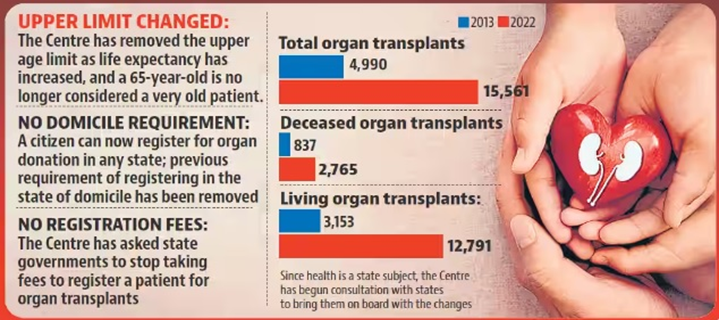Why in news?
- The Union health ministry modified national organ transplantation guidelines to allow even those above 65 years of age to register to receive an organ for transplantation from deceased donors.
What’s in today’s article?
- Organ transplantation in India – statistics, regulatory framework
- News Summary
Organ transplantation in India
Statistics
- According to data accessed from the Health Ministry, the number of organ transplants have increased by over three times from 4,990 in 2013 to 15,561 in 2022.
- Of the 15,561 transplants, a majority — 12,791 (82%) — are from live donors and 2,765 (18%) are from deceased organ or cadavers transplants.
- Up to 11,423 of the 15,561 organ transplants are for the kidney, followed by liver (766), heart (250), lung (138), pancreas (24) and small bowel transplants (3).
- There is also a geographical skew in deceased donations.
- All but two deceased organ donations in 2021 were in 15 states.
- The top five — Telangana, Tamil Nadu, Maharashtra, Gujarat, and Karnataka — accounting for more than 85% of the total.
- One reason for the geographical skew could be that most organ transplant and harvesting centres are concentrated in these geographies.
- India has an organ donation rate of about 0.52 per million population.
- In comparison, the organ donation rate in Spain, the highest in the world, is 49.6 per million population.
Regulatory frameworks guiding the organ transplantation in India
- Legislation
- In 1994, The Transplantation of Human Organs Act (THOA) was promulgated by the government of India.
- The Transplantation of Human Organs Rules followed in 1995 and were last amended in 2014, increasing the scope of donation and including tissues for transplantation.
- The act made commercialization of organs a punishable offence and legalized the concept of brain death in India allowing deceased donation by obtaining organs from brain stem dead person.
- Institution
- National Organ and Tissue Transplant Organization (NOTTO) is a national level organization set up under Ministry of Health and Family Welfare.
- Besides laying down policy guidelines and protocols for various functions, it coordinates all the activities associated with organ donation at national level.
News Summary
- The Union Health Ministry is working on a 'One Nation, One Organ Allocation' policy in consultation with states to come up with uniform guidelines for registration, allocation and other aspects of the process.
- Working towards firming up the policy, the ministry has recommended several changes in the organ transplant rules.
- The government is also planning to introduce a chapter in school curriculum regarding organ donation awareness for students.
What are the changes brought in organ transplantation policy?

- Upper age limit for registration has been removed
- The new guidelines have done away with the 65-year age limit for registration of patients seeking organs from a deceased donor.
- There was no age cap for living donor transplants, where family members donate organs like kidneys and livers.
- However, people over the age of 65 years couldn’t register to receive organs from deceased donors as per guidelines of NOTTO
- No domicile requirement
- It has asked states to remove the domicile criterion for registering those seeking organs from deceased donor for transplant procedures.
- Now the needy person can go to any state of the country and register for getting organ and also get the transplant done.
- The patient will be allotted a unique ID by NOTTO on registering.
- This will get carried forward even if the patient changes multiple hospitals in different States.
- No registration fee required
- Noting that some states have been charging fees ranging between Rs 5,000 to 10,000 for registering such patients, the Union Health Ministry has asked them not to charge money.
National Organ and Tissue Transplant Organisation (NOTTO)
- NOTTO is a national level organization set up under Directorate General of Health Services, Ministry of Health and Family Welfare.
- It functions as apex centre for all India activities of coordination and networking for:
- procurement and distribution of organs and tissues; and
- registry of Organs and Tissues Donation and Transplantation in country.










